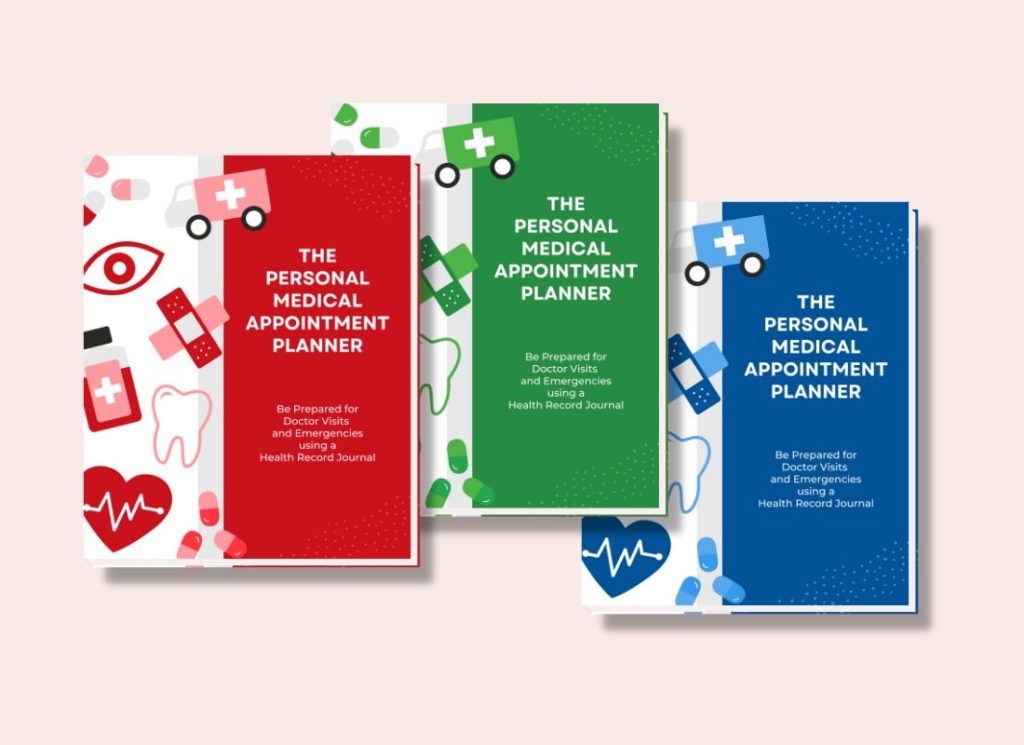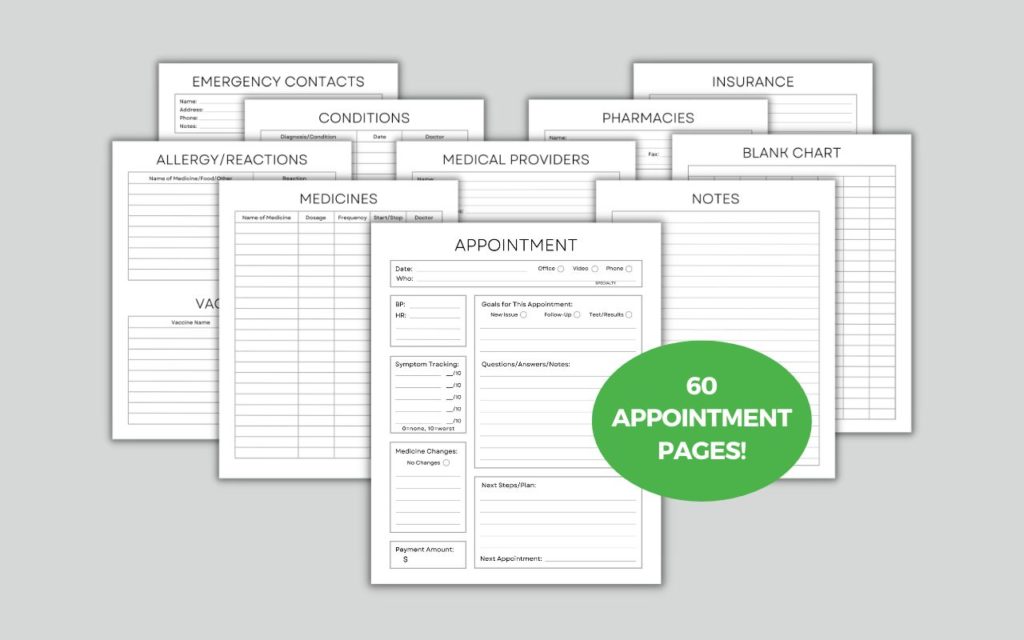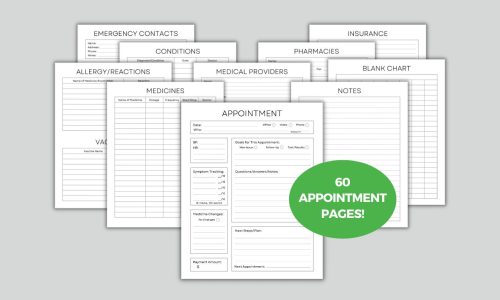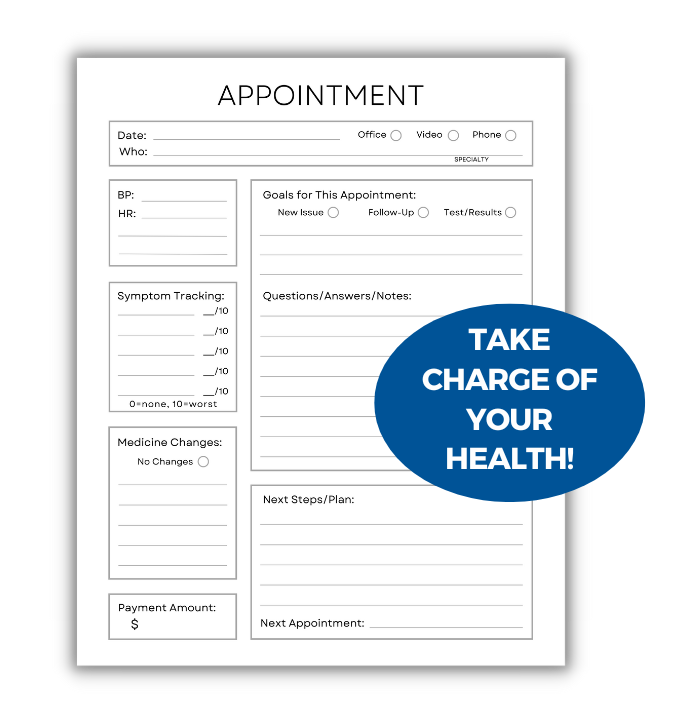Your Voice Matters!
Make Every Appointment Count
Use this powerful appointment planner to ADVOCATE for yourself, stay organized, and make sure your voice is heard at every medical visit.



Each Book Contains:
-
Emergency Contacts - 2 pages
List anyone who should be contacted first in an emergency.
-
Conditions - 2 pages
List your diagnoses and conditions. It makes filling out those first appointment intake forms so much easier!
-
Medical Providers - 6 pages
List all your doctors, with their phone numbers and addresses.
-
Pharmacies - 2 pages
Your doctor always asks for your pharmacy, address, and phone number. Now you will have it always!
-
Insurance - 6 pages
You may have more than one insurance. List them all for medical, dental, eye, pharmacy, etc.
-
Medicines - 6 pages
This one is important. List your meds and who prescribed them. This is the master list and update them as you go.
-
Allergy/Reactions - 1 page
List any allergies or adverse reactions to medicines, and food, and don't forget things like adhesive tape and latex!
-
Vaccines - 1 page
Do you remember when you had your last tetanus shot? Put it all here.
-
Appointment - 60 pages
This is the most important page! Write down your questions before the appointment. Be prepared. Then take notes so you don't forget anything.
-
Notes - 11 pages
This is where everything else goes. You may need a spot for notes when you call the insurance company or for details not covered on another page.
-
Blank Chart - 11 pages
List out your blood pressures taken at home or other vital info that you want to track and possibly share with your doctor at the next appointment.
-
Emergency Contacts - 2 pages
List anyone who should be contacted first in an emergency.
-
Conditions - 2 pages
Here is where you put your diagnoses and conditions. It makes filling out those first appointment intake forms so much easier!
-
Medical Providers - 6 pages
List all your doctors, with their phone numbers and addresses.
-
Pharmacies - 2 pages
Your doctor always asks for your pharmacy, address, and phone number. Now you will have it always!
-
Insurance - 6 pages
You may have more than one insurance. List them all for medical, dental, eye, pharmacy, etc.
-
Medicines - 6 pages
This one is important. List your meds and who prescribed them. This is the master list and update them as you go.
-
Allergy/Reactions - 1 page
List any allergies or adverse reactions to medicines, and food, and don't forget things like adhesive tape and latex!
-
Vaccines - 1 page
Do you remember when you had your last tetanus shot? Put it all here.
-
Appointment - 60 pages
This is the most important page! Write down your questions before the appointment. Be prepared. Then take notes so you don't forget anything.
-
Notes - 11 pages
This is where everything else goes. You may need a spot for notes when you call the insurance company or for details not covered on another page.
-
Blank Chart - 11 pages
List out your blood pressures taken at home or other vital info that you want to track and possibly share with your doctor at the next appointment.

Do you get the
"Deer in the headlights"
look during doctor appointments?
How to take notes for your appointment:
Prepare your questions ahead of time.
No chance of forgetting something during those short appointments.
Rate your symptoms.
Track trends with changes of treatments.
Keep an updated list of medications to share with all providers.
Jot down any changes in meds during your appointments. Update the master list for easy sharing with all your providers.
Take accurate notes.
Have an organized place to write down anything you want to remember later. Note any medical terms you want to look up, treatment options mentioned, and test results.
Write down the plan of action.
Make an appointment for a new referral, test, or follow up plan. Pick up new prescription or start a new diet and exercise plan. This is your TO-DO list. Write down all steps that YOU need to do before the next appointment.

Self care includes taking care of your health!
Being organized can help you identify costly mistakes.
Too often, we have to coordinate our own health care because providers, insurance companies, pharmacies, etc make mistakes, referrals don’t get sent, and dosages are miscommunicated. Having current information from appointments at your fingertips helps you advocate for your care.

THANK YOU for taking the time to read all the way to the bottom!
I’ve spent most of my life caring for others. I had to learn to focus on myself and think about what I wanted. Not an easy task for most moms out there! I started to publish books as a fun and creative outlet. Now I am creating tools to help not just myself but anyone who wants to find themselves again.
Stacy

THANK YOU for taking the time to read all the way to the bottom!
I’ve spent most of my life caring for others. I had to learn to focus on myself and think about what I wanted. Not an easy task for most moms out there! I started to publish books as a fun and creative outlet. Now I am creating tools to help not just myself but anyone who wants to find themselves again.
Stacy

THANK YOU for taking the time to read all the way to the bottom!
I’ve spent most of my life caring for others. I had to learn to focus on myself and think about what I wanted. Not an easy task for most moms out there! I started to publish books as a fun and creative outlet. Now I am creating tools to help not just myself but anyone who wants to find themselves again.
Stacy